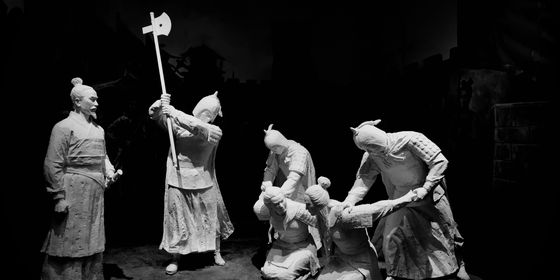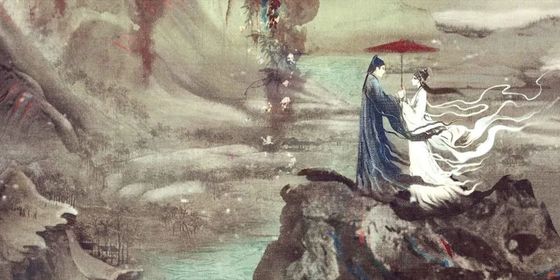How Guangxi’s ‘Goddess of Singing’ became a million-dollar light show
Last week, natural theater project Impressions Liu Sanjie (《印象·刘三姐》) announced bankruptcy. Fortunately for fans of the Guilin, Guangxi attraction, Liu Sanjie’s official Weibo account later clarified that company restructuring will not impact their ability to see the nightly outdoor song-and-dance numbers, performed with extravagant lights on the Li River against the picturesque karst formations of Yangshuo county.
Co-directed by Zhang Yimou, Wang Chaoge, and Fan Yue, the show earned a revenue of 0.21 billion RMB and a net profit of nearly 0.1 billion RMB in 2017, spawning a copycats in scenic spots across China: Impressions West Lake in Hangzhou, Impressions Lijiang, Impressions Hainan….
Liu Sanjie is actually the odd name out, but revelations that the company’s bankruptcy was caused by unwise loans and investments make it timely to revisit story behind the name, involving a local deity whose heroic sacrifices and connection to Guilin have lately been overshadowed by the tourist branding.
Chinese folklore generally agrees that Liu Sanjie was a “Goddess of Singing” born in the Guangxi Zhuang Autonomous Region during the Tang dynasty (618 CE- 907 CE), and that she had great musical talent. One story goes that Liu was born in a small village in Luocheng county and brought up by her older brother, and they made a living fishing and collecting firewood. Liu was beautiful, diligent, good at weaving, and famous for her musical ability. Because she sang folk songs describing the suffering of the poor, Liu was hated by local landlords (unsurprisingly, movies and operas about Liu made in the 1950s and 60s used this version of the story).
Like a cartoon villain, local tyrant Mo Huairen (莫怀仁) tried many ways to defeat Liu: He tried to force Liu to be his concubine (and failed), then prohibited the poor from singing and invited three scholars to best Liu at a singing competition (and failed). Enraged, Mo decided to just kill her. Villager helped Liu and her brother flee to Liuzhou city, but Liu still would not give up singing, and her songs inspired people to sing with her in defiance of Mo. To keep the villagers from being killed on her behalf, Liu jumped into Lake Xiaolongtan, but the moment she hit the water, a huge golden carp jumped out and carried Liu to the heavens where she became an immortal. Villagers then passed down her songs through the generations.
Another story says that Liu Sanjie was a prodigy who could compose and improvise songs on any appointed theme by the age of 12. To escape an arranged marriage, the 15-year-old Liu fled with her lover. No one knows where they went, but they were believed to turn immortals.
Yet another story goes that Liu Sanjie was killed by a jealous rival. After her death, Liu flew to heaven on a carp.
Historical records in different parts of Guangdong province and Guangxi autonomous region also reference such a person as Liu, but she is sometimes referred to as Liu Sanmei (刘三妹) or Liu Santai (刘三太, tai being a general title of respect). These records contain less daring escapes and immortality than the folk legends.
Liu’s story has also been told in the Kunqu (昆曲, Jiangnan opera), Zhengzi opera (正字戏), Caidiao opera (彩调剧), musical theater, and many other types of theater, with the earliest Kunqu play Liu Sanmei dating back to Qing dynasty under the reign of Emperor Qianlong (1736 CE-1796 CE). Between February and April, 1960, Guangxi’s Party Committee ordered Liu’s story to be performed in 11 types of drama across the region and drew over 12 million viewers. And Liu Sanjie (《刘三姐》, Third Sister Liu in English), China’s first musical film, made Liu Sanjie and the shooting locations of Guilin and Liuzhou household names not only in China but southeast Asia.
In any case, the musical goddess has been venerated for many generations by the Zhuang people, who have longstanding music traditions. The Zhuang traditional folk song festival on the third day of the third lunar month, an official two-day holiday in Guangxi since 2014, is said to have started in her honor. Impressions Liu Sanjie was created in 2004. In 2006, at the application of the local government of Liu’s hometown, “Liu Sanjie folk songs” became recognized as one of the first national cultural heritage items in China.












